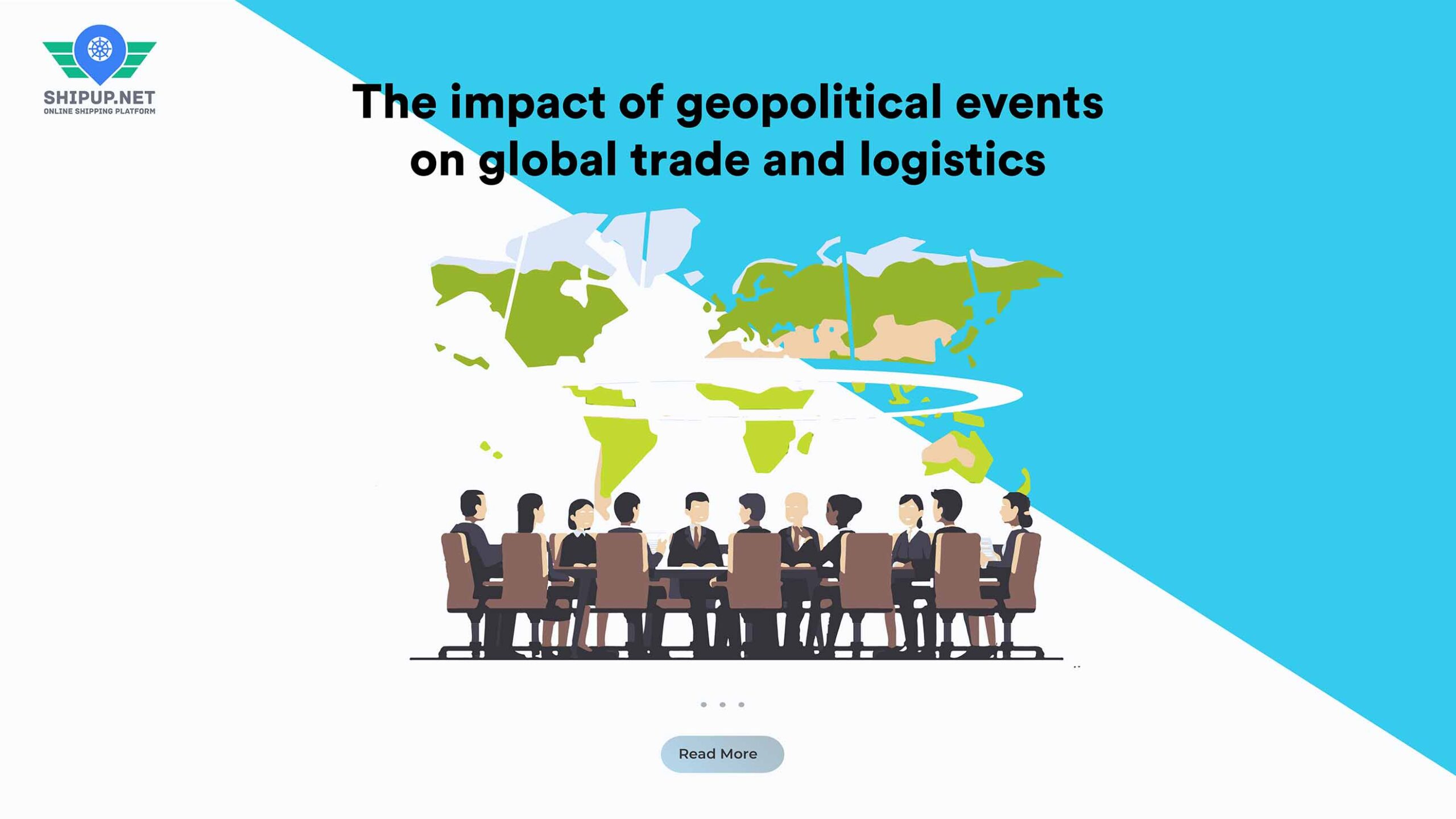The impact of geopolitical events on global trade and logistics cannot be understated. As the world navigates through unpredictable times, supply chains are being exposed to the weaknesses of a system that prioritizes efficiency over resilience. The COVID-19 pandemic has exacerbated existing trends and has drastically impacted businesses worldwide. Therefore, it is more important than ever for companies to incorporate geopolitics into their supply chain analysis and planning.
Before COVID-19, there were four primary themes of geopolitical uncertainty: shifts in the international system’s structure and institutions, citizen dissatisfaction leading to the rise of populist politics, dramatic tech transformation, and climate change disrupting supply chains. However, the pandemic has added new complexities and uncertainties to the mix. As a result, businesses must engage in comprehensive risk analysis and stay informed of geopolitical developments to safeguard their supply chains.
The geopolitical landscape is undergoing a significant shift as the international system, with its key institutions, faces pressure from the rise of populism and the tendency towards self-reliance. The construct created to maintain stability and promote free trade is now under considerable scrutiny. Businesses must take into account the political nature of international relations and the politicization of trade when assessing their supply chain risks. In conclusion, companies must integrate geopolitics into their supply chain planning and analysis to effectively navigate the chaotic and unpredictable geopolitical landscape.
Geopolitical Competition and the Rise of Protectionism
The strategic competition between China and the United States has significant implications across the international system, ranging from norms and rules for international trade to domestic market dynamics. As the geopolitical landscape continues to fracture, bilateral and multilateral relationships are becoming increasingly politicized and unpredictable. This shift drives domestic market dynamics towards greater self-reliance, a trend inextricably interconnected with rising political tensions.
As a result, pre-existing trade tensions are intensifying, and tariff and non-tariff barriers are being imposed or threatened. Governments are increasingly focused on ensuring the stability and continuity of domestic industries in distress, resulting in an increased interest in strategic self-sufficiency, on-shore or near-shoring, and stockpiling. This shift from liberalism to protectionist tendencies is compounded by the changes brought about by COVID-19, with growing concern around vulnerabilities associated with over-reliance on key trading partners.
The anxiety around vulnerabilities includes concerns around the slowdown or shutdown of key suppliers and critical operations, delays in getting inbound and outbound raw materials to production sites and finished goods to market, and challenges around insolvency for upstream partners and key customers. To mitigate risks, companies must focus on the adequacy of their contingency plans and the long-term sustainability of their current strategies, taking into account geopolitical trends that could disrupt their supply chains. In conclusion, shifts in international relations and the rise of protectionism are challenging businesses worldwide to adapt their supply chain strategies to navigate the unpredictable and volatile geopolitical landscape
Impact of Political Trends on Global Trade and Logistics
With growing discontent fueled by populism, political and economic policies are being swayed by an inward-looking approach rather than international engagement and cooperation. Leaders who tap into this political trend actively promote anti-pluralism, making international cooperation less likely. This shift in approach has detrimental effects on global trade and logistics.
These political trends cause major unpredictability in social and economic policies, leading to rapid changes in the conditions for doing business. There is a tendency to prioritise domestic markets based on internal political logic instead of global economic logic. Even democratic institutions, such as free media and independent judiciary, suffer as countries veer towards extreme left or right policies to appeal to their domestic power base.
The COVID-19 pandemic has further exacerbated the trend, deepening inequality and poverty and breeding mistrust, disillusionment, and alienation from the system. Moving forward, this trend is expected to intensify around the world, with decisions about global trade and logistics being undergirded more by political than economic considerations. As business leaders continue to navigate these uncertain times, they will need to remain aware of the potential impacts and prepare accordingly.
Technological Transformation in Global Trade and Logistics
The rapid advancement of digitisation technology has brought about a revolution in global trade and logistics. E-commerce, process automation, data collection, and artificial intelligence are providing businesses with new ways to engage with customers through increased efficiencies and value-creation opportunities. Meanwhile, technology is also enhancing customs controls, reducing compliance risk, and ensuring the safety and security of global trade.
However, while technological transformation offers many benefits, it also brings uncertainty. There are concerns about job security, national security, and commercial governance with the emergence of technology divisions between China and the US. These divisions threaten the interoperability of technology systems and information flows across borders and may end up dividing businesses between two technology hemispheres.
As businesses continue to navigate this unparalleled technological change, optimising all modules of their supply chains through digitisation becomes non-negotiable. Existing digital infrastructure needs to cope with severe business disruptions, and businesses must uplift capabilities to meet demand while ensuring flexibility in digital investments. This adaptability is crucial should there be an increasing need for businesses to bridge technology divides.
Climate Change and Supply Chains: Preparing for the Future
Climate change poses an existential threat to global trade and logistics, with extreme weather events like the 2020 bushfires causing physical risks to operations. Furthermore, resource scarcity with the lack of access to safe water supply and the rise in socio-political risks like mass migration, displacement, health crises, and unrest are major concerns that will impact global trade and logistics systems.
Supply chains are particularly vulnerable to climate change-induced disruption. Extreme weather events can shut down critical supply routes, leading to increases in transportation and insurance costs. Changing consumer preferences are fast driving sustainable goods demand, and companies failing to address these expectations may suffer. The impact of carbon pricing schemes could drive business costs higher, but it may push such businesses towards green investments and technology.
It remains crucial for businesses to consider the risks posed by climate change and implement strategies to manage the impacts of such risks on global trade and logistics systems. These strategies include embracing more sustainable goods and services, outsourcing critical supply chain management, and developing business continuity plans that are flexible enough to adapt to new scenarios. Business leaders must remain vigilant to ensure continued access to critical resources and be proactive in protecting supply chains to ensure they remain resilient to disruptions stemming from climate change.
Strategic Thinking in Global Trade: Navigating Risk and Embracing Opportunity
Navigating the risks and opportunities in global trade and logistics demands strategic thinking and the ability to be proactive in mitigating risks while embracing new opportunities. Businesses need to take a geopolitical perspective of the world to ensure they are not overly impacted by the risks posed by current and upcoming geopolitical trends.
COVID-19 has already demonstrated the substantial knock-on effects of supply chain disruptions, and this underscores the importance of future-proofing supply chains. Businesses need to work towards developing a more sustainable and resilient supply chain by addressing shutdowns of key suppliers, counterparty risk and solvency concerns with upstream suppliers, and ensuring the adequacy of contingency plans.
In the post-COVID-19 era, businesses should focus on local and regional value chains and a more robust symbiosis between domestic and international market opportunities. As businesses embrace the opportunities of the future, they should remain cognizant of geopolitical risks and consider them in planning for the recovery process.



